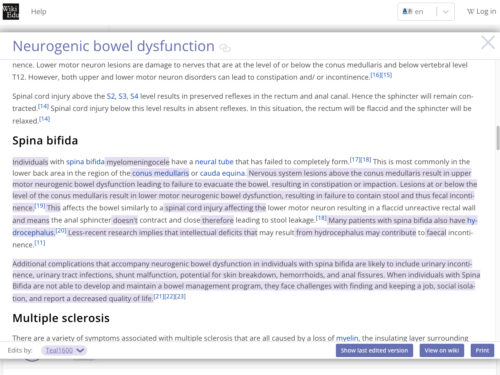For millions of people around the globe, Wikipedia is the first stop in their search to better understand a topic. But what shapes public understanding, opinions, and even decision-making just as much as what’s on Wikipedia? The knowledge that’s still missing.
And there’s no doubt that much work remains to improve Wikipedia’s coverage of adult intellectual and developmental disabilities (I/DD). But thanks to the editing efforts of participants enrolled in two of Wiki Education’s Wiki Scientists courses earlier this summer, Wikipedia now offers more accurate and representative information on I/DD healthcare topics, and increased visibility for I/DD communities and histories.
Sponsored by the WITH Foundation, the 8-week courses brought together healthcare professionals, scholars, advocates, and participants with lived experience to learn how to contribute to Wikipedia. From how to choose an article to work on, evaluate sources, and engage with other volunteer editors to how to make live edits on a Wikipedia article, the two cohorts learned the ropes from their Wiki Education facilitator.
“I’ve learned so much and really appreciate the introduction into the Wikipedia community,” said professor Whitney James, reflecting on her experience in the course. “Editing Wikipedia and navigating the rules can be intimidating, but Wiki Education creates a welcoming and collaborative environment. Each instructor brings their own knowledge to the courses and highlights different ways to make an impact. It’s also fun to hear about the work that other participants are doing and to learn from their experiences.”
James’ feedback underscores the intention behind the WITH-sponsored courses: give participants the skills, structure, and confidence to improve topics related to I/DD, not only for those with I/DD, but also for lawmakers, caretakers, journalists, practitioners, educators, advocates, and others who turn to Wikipedia to learn more.
James joined the editing course knowing she wanted to contribute something that felt meaningful, but was unsure of which direction to take. She began by exploring the Wikipedia category “disability rights” – and quickly uncovered a gap in Wikipedia’s coverage of disability rights protests.
“The Disability Rights march was important for highlighting both the perspectives of disabled people and their allies…and as a method of acknowledging how disabled activists are often overlooked in the organization of physical marches,” explained James, who created the Disability March article and improved other related articles throughout the course.
While James lent her efforts to improving Wikipedia’s coverage of this milestone in I/DD history, one of her fellow course participants worked to expand sections of the Wikipedia article on Neurogenic bowel dysfunction (NBD), the reduced ability or inability to control defecation due to deterioration of or injury to the nervous system.

This editor expanded the sections on the signs and symptoms, management, and most notably, the article’s section on spina bifida, where they transformed this short section by adding informative details and context, including a change in the wording to alert readers that some of the existing information may be out of date.
Another course participant turned their attention to the disability justice article to create a robust new section on medical ableism, detailing how systemic biases in healthcare can marginalize people with I/DD. This editor’s contributions about topics like diagnostic overshadowing, inaccessible equipment, exclusionary researching, and harmful assumptions about quality of life now offer a more complete picture of the disability justice movement’s critiques of healthcare and public health.
Every Wikipedia article created or expanded through these courses is a step toward a more accurate, equitable, and inclusive information landscape – one where I/DD experiences and healthcare topics are more visible and accessible to all.
In the coming weeks, we’ll take a closer look at the contributions of two WITH course participants who brought their expertise and lived experiences to their work to improve Wikipedia’s coverage of I/DD healthcare topics. Stay tuned for their stories!
Interested in learning how to add your expertise to Wikipedia? Explore Wiki Education’s upcoming courses for subject-area experts.
